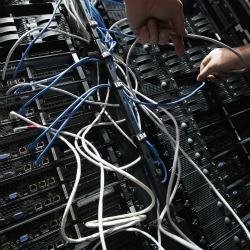BOB GARFIELD: Last month, President Obama announced new sanctions targeting individuals and entities that sell surveillance software and hardware to Iran and Syria. But the use of this surveillance technology is much broader than just those two countries. It’s employed to monitor citizens across the region, including nations considered allies by the United States. Margaret Coker, Middle East correspondent for The Wall Street Journal, has been part of the award-winning team behind Censorship, Inc., a series dedicated to tracking the use of this technology in the region. She was in Libya during the rebel siege on Tripoli and, after days of searching, found herself standing in one of Muammar Gaddafi’s surveillance centers.
MARGARET COKER: My taxi driver, who had been tortured by Gaddafi, took me back to the place where he had been imprisoned and that was the secret headquarters for the surveillance technology, as well. So he was breaking out into a cold sweat. I walked into this abandoned building that was littered with AK-47 cartridges. There were refrigerator-size computer servers that had gone offline - there wasn’t any electricity in the city that point - and probably half a football field-size room full of the printouts of people’s email chats, Facebook chats and a whole lot of other online correspondence kept by the regime.
BOB GARFIELD: The hardware that made this possible for the Gaddafi regime was manufactured and imported by western companies.
MARGARET COKER: That’s right. There was a French software company that’s now a subsidiary of a larger defense contractor, with very close ties to the Sarkozy government. The French company actually developed it and kept refining it according to the Libyan needs. And what the Libyans wanted to do was monitor people that Gaddafi considered enemies of his regime.
And as far as all of the hard copy files that I was able to sift through, these people weren’t Islamic extremists, they weren’t Jihadis. These were human rights workers. They were democracy activists. Basically, it seemed like if you had written an email that just criticized Gaddafi or a member of his family, that started your file going then.
BOB GARFIELD: So as you go around the world from repressive regime to repressive regime, how much of this infrastructure is built locally? How much of it comes from China and how much of it does come from the West?
MARGARET COKER: Well, there’s great competition between Chinese- manufactured surveillance technology and western countries’ own technology. Technology is – it’s like a knife. It can slice butter for your bread in the morning and it can also be used to commit murder. There is no moral compass for this surveillance technology.
BOB GARFIELD: The President’s sanctions aim at Iran and Syria, but our nominal allies are using similar technology to monitor their own populations. Is anything being done to limit the sale of surveillance architecture in Bahrain, Saudi Arabia, Egypt and so on?
MARGARET COKER: No. If you're an enemy and there’s a lot of bloodshed in your country, like Syria, you get sanctioned in executive orders. If you're an ally who says that they want to keep a nuclear weapon out of Iranian hands, like Saudi Arabia does, you can buy this technology to monitor your own pro-democracy activists. There is no outcry in Washington about the Saudi dissidents that have been put in jail or much outcry, unfortunately, about the Bahraini activists also put in jail.
The executive order is – I’d consider it a political feel-good press release. The White House can look good about its record on human rights and standing up for democracy, as well as keep clear of the very thorny issue of trying to define surveillance technology, redefining what should be banned exports or not banned exports. In an election year you really don’t want to make an enemy out of tech companies or their lobby in northern California.
BOB GARFIELD: So if what the President is doing is sort of strictly election year atmospherics, can and should the West be cracking down on any kind of export of this technology?
MARGARET COKER: One thing that our series shows is that governments and companies in not-so-savory countries will, will be able to get around bans and, and sanctions. They’ll procure things because there’s always a middleman who will sell it on to them. I mean, right now you have surveillance networks that exist in almost every single Middle Eastern country. What should be done is probably help those activists in those countries find ways around the surveillance net that has been set up.
BOB GARFIELD: Margaret, thank you so much.
MARGARET COKER: You’re welcome.
BOB GARFIELD: Margaret Coker is Middle East correspondent for The Wall Street Journal.

